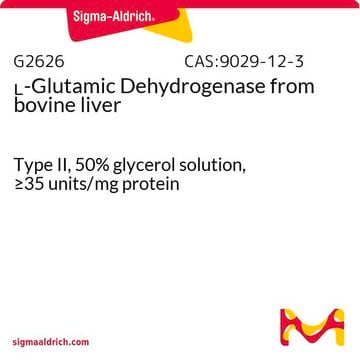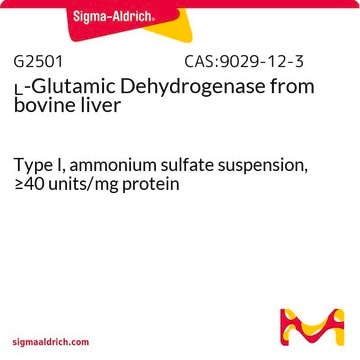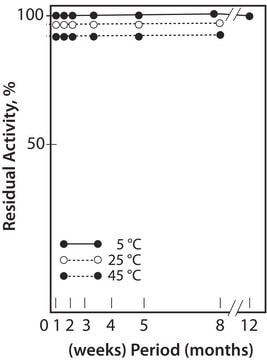10197734001
Roche
Glutamate Dehydrogenase (GlDH)
from beef liver
Sinónimos:
DNA marker
About This Item
Productos recomendados
biological source
bovine liver
Quality Level
form
lyophilized
specific activity
10 U/mg
~10 units/mg protein (at 25 °C with 2-oxoglutarate as the substrate, and ADP as the activator.)
packaging
pkg of 3,000 U
manufacturer/tradename
Roche
concentration
≥10-20 % (w/w)
technique(s)
activity assay: suitable
color
white
optimum pH
8
solubility
water: 20 mg/mL, colorless
suitability
suitable for UV spectrophotometry and general use
UniProt accession no.
application(s)
life science and biopharma
foreign activity
ADH <0.00500%
LDH <0.00500%
MDH <0.00500%
shipped in
wet ice
storage temp.
2-8°C
Gene Information
bovine ... GLUD1(281785)
Categorías relacionadas
General description
Application
Quality
Sequence
Other Notes
Storage Class
11 - Combustible Solids
wgk_germany
WGK 1
flash_point_f
does not flash
flash_point_c
does not flash
Certificados de análisis (COA)
Busque Certificados de análisis (COA) introduciendo el número de lote del producto. Los números de lote se encuentran en la etiqueta del producto después de las palabras «Lot» o «Batch»
¿Ya tiene este producto?
Encuentre la documentación para los productos que ha comprado recientemente en la Biblioteca de documentos.
Los clientes también vieron
Nuestro equipo de científicos tiene experiencia en todas las áreas de investigación: Ciencias de la vida, Ciencia de los materiales, Síntesis química, Cromatografía, Analítica y muchas otras.
Póngase en contacto con el Servicio técnico







